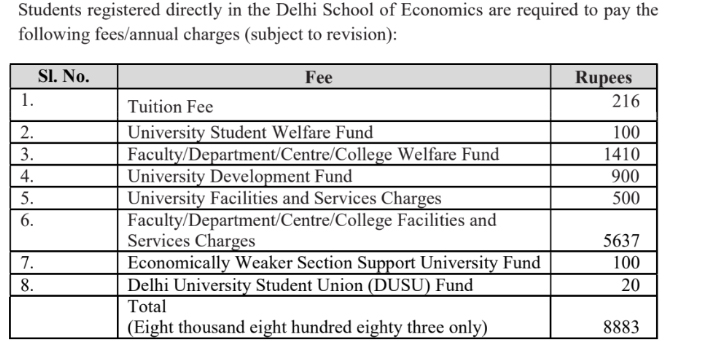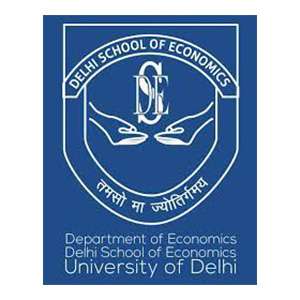Master's Programme at Delhi School of Economics (DSE MA Economics)
The M.A. in Economics is a two-year full-time programme with each year comprising the summer and winter semesters. It consists of fifteen courses, of which six are compulsory core courses and nine are elective/optional courses. Every student is required to complete the programme within a span period of four years of initial admission. The medium of instruction and evaluation is English.
Course Structure

DSE MA Economics Admission Procedure
Admission to the Postgraduate programs at the University of Delhi (UoD) for the academic year 2023 will be conducted through a Common University Entrance Test (CUET) for Postgraduate programs (PG) – 2023. Here are the key points regarding the admission process for Postgraduate programs, including the Postgraduate Program in Economics:
Registration for CUET (PG) – 2023: All candidates interested in applying for Postgraduate programs at the University of Delhi, including the Postgraduate Program in Economics, must register for the Common University Entrance Test (CUET) – 2023. This registration typically takes place on the official CUET website, which is http://cuet.nta.nic.in.
Common Seat Allocation System (PG) – 2023: After registering for CUET (PG) – 2023, candidates need to apply for the Common Seat Allocation System (CSAS (PG) – 2023) on the admission portal of the University of Delhi. The CSAS is the platform through which seat allotment for Postgraduate programs is conducted.
Admission Based on CUET Scores: Admissions to Postgraduate programs, including the Postgraduate Program in Economics, at the University of Delhi will be based on the scores obtained in the Common University Entrance Test (CUET) – 2023. Your performance in the CUET examination is a critical factor in the admission process.
Supernumerary Seats: It’s worth noting that the admission process also considers candidates applying for Supernumerary seats, and they need to follow the same registration and application procedures.
Please keep in mind that specific dates, eligibility criteria, and other details related to CUET (PG) – 2023 and the admission process may be available on the official websites of the University of Delhi and the CUET (PG) – 2023. It’s essential to regularly check these websites and follow the guidelines provided for a smooth application and admission process.
DSE MA Economics & CUET PG Past Year Papers
Eligibility Criteria for DSE MA Economics
The eligibility criteria for DSE is as follows:
A Bachelor’s degree from a recognized university with either Mathematics at the 10+2 level or completion of at least one mathematics course during the Bachelor’s degree.
Alternatively, a Master’s degree from a recognized university with either Mathematics at the 10+2 level or completion of at least one mathematics course during the Master’s degree.
For candidates belonging to UR/OBC/EWS categories, a minimum of 50% marks in aggregate or an equivalent grade is required.
For candidates belonging to SC/ST/PwBD categories, a minimum of 45% marks in aggregate or an equivalent grade is required.
No. of Seats for DSE MA Economics
The admission statistics provided for the Department of Economics at the University of Delhi are as follows:
Category 1:
UR (General Category): 59 seats
SC (Scheduled Caste): 21 seats
ST (Scheduled Tribe): 11 seats
OBC (Other Backward Classes): 39 seats
EWS (Economically Weaker Section): 15 seats
Category 2:
UR (General Category): 59 seats
SC (Scheduled Caste): 22 seats
ST (Scheduled Tribe): 11 seats
OBC (Other Backward Classes): 39 seats
EWS (Economically Weaker Section): 14 seats
It’s important to note that the number of seats may be subject to change based on decisions made by the University of Delhi. Additionally, there may be supernumerary seats available as per the University’s norms, which could further impact the total number of seats.
For the allocation of seats, all candidates, regardless of category, will be considered in the common merit list. However, for Category 2, only students of the University of Delhi will be considered, and they must meet specific program-specific eligibility criteria for admission.

Fees for DSE MA Economics
With effect from the session 2023-24, an annual fee of Rs. 8883 is payable by the students of M.A. Economics students

Economics (COQP10) Syllabus for CUET PG 2024
Microeconomics
Consumer Theory:
Demand, Utility, Indifference Curve, Revealed Preference Theory, Consumer Surplus. Production Theory: Production Function, Law of Variable Proportions, Returns to Scale, Cost Function.
Price and Output Determination in Markets:
Perfect and Imperfect Competition, Monopoly, Price Discrimination, Monopolistic, Duopoly, and Oligopoly models, General Equilibrium, Efficiency, and Welfare.
Macroeconomics:
National Income Accounting. Income and Output Determination: Aggregate Demand and Aggregate Supply, Effective Demand Principle, Classical and Keynesian Theory.
Money and Inflation:
Demand and Supply of Money, Money Multiplier, Credit Creation, Role of Reserve Bank of India, Quantitative Theories of Money, Philip’s Curve, Monetary and Fiscal Policy of India.
Consumption and Investment Function:
Permanent, Relative, and Life Cycle Hypothesis, Multiplier and Accelerator.
Open Economy Models:
Mundell and Fleming Model, Balance of Payments, Exchange Rate Determination, Purchasing Power Parity.
Economic Growth:
Harrod-Domar Model, Solow Model.
Statistical Methods in Economics:
Mean, Mode, Median, Dispersion, Skewness, Quartile Deviation, Average Deviation, Standard Deviation. Correlation.
Mathematical Methods in Economics:
Sets and Vectors. Functions of one and several real variables, Single and Multi-variable optimization, Integration of functions.
Difference equations, Determinants, Matrix. Linear Programming, Probability, Differential Equations.
Indian Economy:
Overview of Colonial Economy: Macro Trends, Agriculture, Railways, and Industry, Economy and State in the Imperial Context.
New Economic Policy.
Public Economics: Public and Private Goods, Externalities, Budget, Deficits, Public Debt, Fiscal Federalism in India, Taxation.
International Trade Theories: Adam Smith, Ricardo, Heckscher-Ohlin model, and New Trade Theories.
A more detailed syllabus has been included in our Blogs.
CUET PG Entrance Exam Paper Pattern and Marking Scheme
1.This paper contains One Section. It contains Domain Specific area comprising of 75 MCQs
2.Total No of Questions- 75
3.Marking Scheme:
4 marks will be awarded for each correct response.
1 mark will be deducted for each incorrect response.
Total Time Allotted : 105 Minutes
DSE MA Economics Placements
DSE graduates have a world of opportunity open up before them. Many are recruited directly from campus by prestigious Indian and multi-national companies, who highly value the analytical and quantitative skills that our programmes emphasize. The department’s placement cell assists students in finding suitable employment. Many are admitted to top PhD programmes abroad and go on to establish impressive careers in academia. DSE alumni can be found among the faculty of the world’s leading universities, including Harvard, Princeton, Columbia, LSE and Oxford, in international agencies like the World Bank, IMF or Asian Development Bank, as well as in the higher echelons of government.



